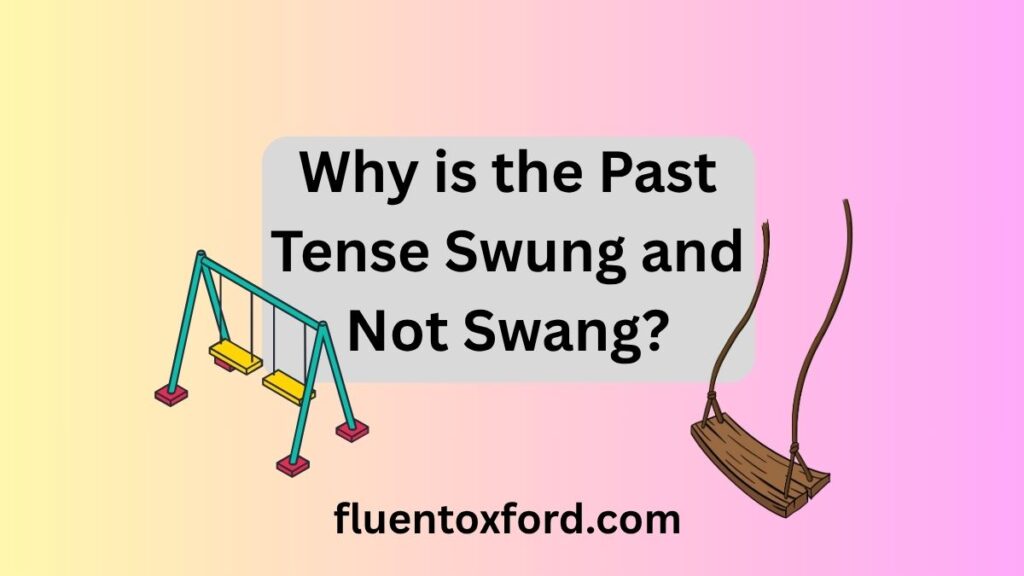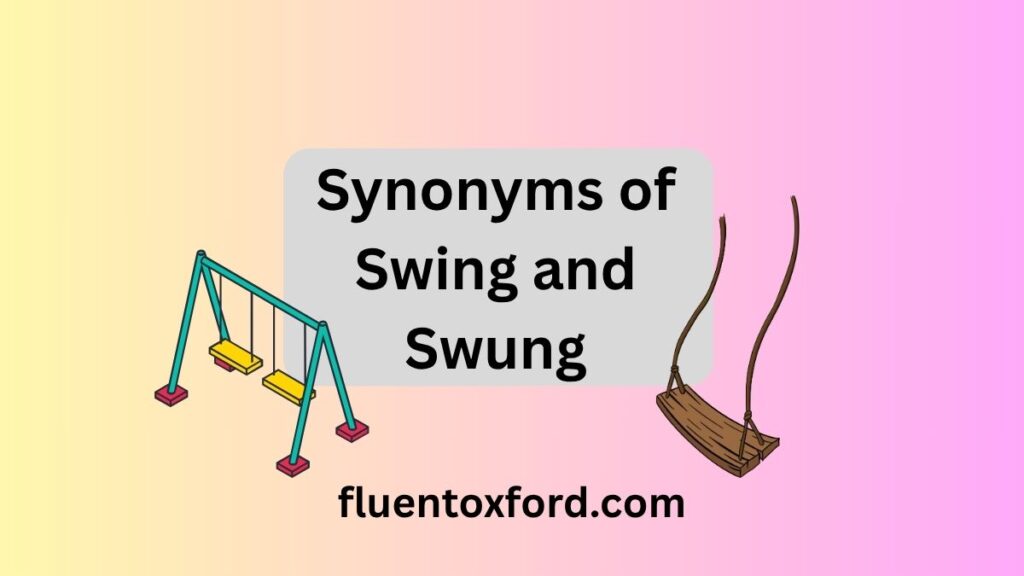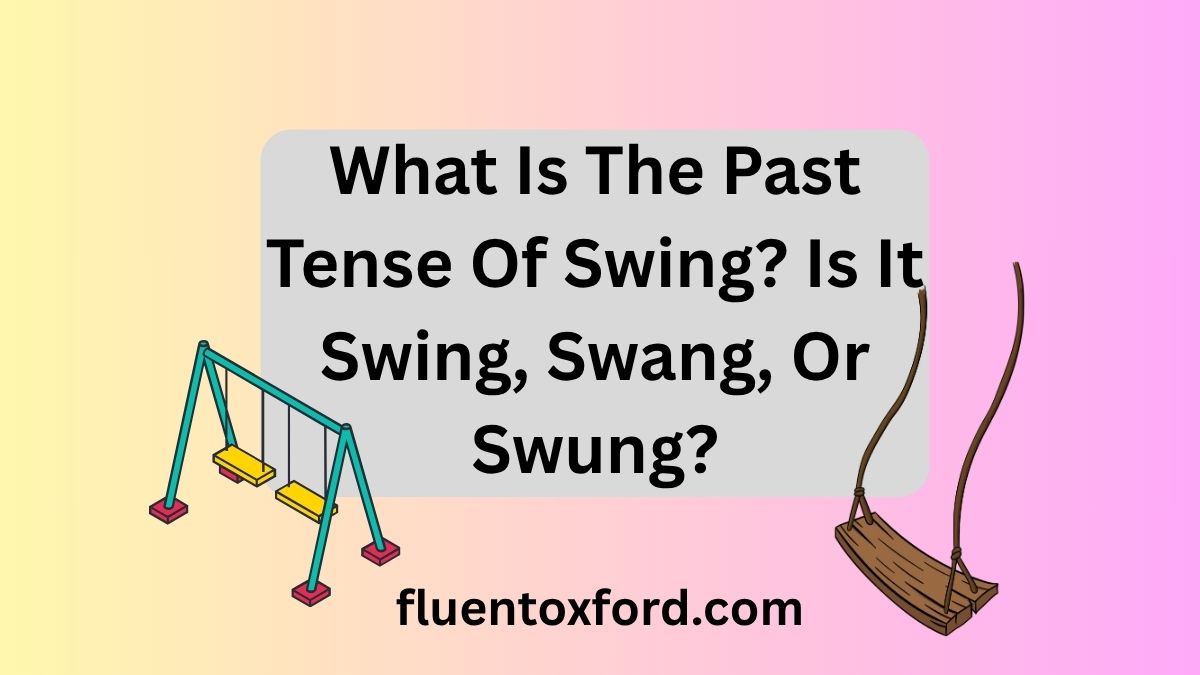The phrase “What is the past tense of swing? Is it swing, swang or swung?” refers to the grammatical process of identifying the correct past tense form of the verb “swing.” In English, verbs often change form to indicate actions that happened in the past. Some follow regular patterns, while others, like “swing,” are irregular and require specific memorization. Knowing the correct past tense form helps ensure proper communication and prevents common grammar mistakes.
Many English learners and even native speakers find themselves pausing mid-sentence, unsure whether to say “swang” or “swung.” The curiosity surrounding this small but important detail makes the topic unexpectedly interesting. If you’ve ever questioned your instinct while writing or speaking, you’re not alone. The correct answer isn’t always what people assume, making it even more essential to explore and fully understand this tricky verb.
When diving into what is the past tense of swing? Is it swing, swang or swung?, it becomes clear that this verb sparks confusion for a reason. Some believe “swang” sounds correct, while others default to “swung.” Learning what is the past tense of swing? Is it swing, swang or swung? not only clears up these misunderstandings but also deepens your grasp of English irregular verbs. By the end of this guide, you’ll confidently know the answer to what is the past tense of swing? Is it swing, swang or swung? and how to use it properly.
Swing, Swang, or Swung: Which is Correct?
You’ve probably asked yourself: Is it swing, swang, or swung?
Let’s break it down:
- Swing is the present tense.
- Swung is the past tense of swing and the correct past participle.
- Swang is an outdated or dialectical form. It rarely appears in modern English and is generally considered incorrect in proper grammar today.
Why Do People Still Say “Swang”?
- Past tense confusion often arises with irregular verbs.
- “Swang” occasionally pops up in regional speech or old poetry but isn’t grammatically correct in modern usage.
- According to English grammar rules and modern dictionaries like Merriam-Webster, swung is the accepted past tense.
💬 Quote:
“In standard English, the past tense of swing is swung, not swang.” – Oxford Learner’s Dictionaries
What is the Past Tense of Swing?
Let’s look at the simple verb conjugation table for swing:
| Verb Tense | Verb Form |
| Present Tense | swing |
| Past Tense | swung |
| Past Participle | swung |
| Present Participle | swinging |
| 3rd Person Singular | swings |
Quick Facts:
- Swing → Present
- Swung → Past
- Swung → Past Participle
👉 You can now see why saying “Yesterday, I swing on the swing” is incorrect. The right sentence is “Yesterday, I swung on the swing.”
Why is the Past Tense Swung and Not Swang?

Historical Reason:
In Old English origins of verbs, swing was conjugated differently. The Old English verb swingan used swang as its past tense form. Over time, the English language simplified many irregular verbs, including swing.
Key Grammar Rule:
Irregular verb patterns don’t follow the typical “-ed” ending. Instead, they change their vowel sounds:
- Begin → Began → Begun
- Sing → Sang → Sung
- Swing → Swung → Swung
Notice that swing skips “swang” in modern grammar, even though it would seem to follow the pattern.
Why Swang Fell Out of Use:
- The verb conjugation rules shifted.
- “Swang” sounds like “sang” but it never fully stayed in modern use.
- Grammar authorities and style guides recognize swung as the only correct past tense now.
Pronunciation Guide: Swing and Swung
Understanding the pronunciation of swing and swung is essential for proper speaking.
How to Pronounce “Swing”
- Phonetic spelling: /swɪŋ/
- Sounds like: swing (rhymes with “king”)
- Tips: Emphasize the “sw” blend at the start.
How to Pronounce “Swung”
- Phonetic spelling: /swʌŋ/
- Sounds like: swung (rhymes with “hung”)
- Tips: The “u” in swung sounds like the “u” in “sun.”
🎧 You can listen to pronunciation examples on trusted sites like Cambridge Dictionary.
Meaning of Swing
The meaning of swing is versatile. It can describe physical movement or more abstract changes.
Core Definitions:
- Back-and-forth motion: Moving in an arc or like a pendulum.
- Rhythmic movement: Gentle, repeated swaying.
- Quick changes: Shifts in mood or opinions.
Common Uses:
- Playground swings: “The children swing back and forth.”
- Pendulum movement: “The clock’s pendulum swings steadily.”
- Rhythmic movement in sports: “He swings the bat smoothly.”
- Emotional shifts: “Her mood swings quickly.”
Tense Table for Swing
Here’s a verb tense chart to help you master swing in all its forms:
| Tense | Example Sentence |
| Present Simple | I swing the golf club with precision. |
| Past Simple | She swung the door open forcefully. |
| Present Continuous | They are swinging on the playground. |
| Past Continuous | He was swinging when the bell rang. |
| Present Perfect | I have swung at many pitches today. |
| Past Perfect | They had swung by before I arrived. |
| Future Simple | I will swing by your house later. |
| Future Perfect | By 5 PM, I will have swung the bat. |
Etymology: Origin of Swing

Where Did the Word Come From?
- Old English: Swingan – meaning “to beat, fling oneself, rush.”
- Germanic Roots: Related to schwingen (German) and swingen (Dutch), all connected to swaying or moving forcefully.
- Historical development of swing:
- Before 12th Century: Used to mean “strike” or “fling.”
- Middle English: Evolved to describe pendulum-like motion.
- Modern English: Expanded to include emotional and abstract swings (like market swings).
Interesting Fact:
“Swang” was once the correct past tense but gradually became obsolete as language patterns evolved.
Usage Examples in Sentences
Using “Swing” in a Sentence
- The door began to swing open with the wind.
- The child tried to swing higher and higher.
- They watched the monkeys swing from tree to tree.
- The heavy lamp started to swing after being bumped.
- Please don’t swing the bat near the window.
- She let the keys swing from her finger as she walked.
- The dancers swing their partners quickly across the floor.
Example Sentences for “Swung”
- He swung the door open with excitement.
- The child swung on the swing set all afternoon.
- She swung her bag over her shoulder and left.
- The monkey swung quickly from branch to branch.
- The old clock’s pendulum swung back and forth.
- They swung their arms as they walked down the street.
- He swung the bat and hit the ball hard.
- The chandelier swung gently when the wind blew through the window.
Difference Between Swing and Swung
| Verb Form | Example |
| Swing | I swing at the ball. |
| Swung | I swung at the ball yesterday. |
Common Mistakes and Misconceptions
Common Grammar Mistakes:
- ❌ Incorrect: I swinged on the swings yesterday.
- ✅ Correct: I swung on the swings yesterday.
- ❌ Incorrect: He swang the bat quickly.
- ✅ Correct: He swung the bat quickly.
Why These Mistakes Happen:
- Verb tense confusion with other irregular verbs like “sing, sang, sung.”
- Misapplying verb conjugation rules from similar verbs.
Important Tip:
There’s no such thing as “swinged.” It’s never correct.
Synonyms of Swing and Swung

Alternative terms of Swing
- Sway: Move slowly side to side.
- Rock: Move back and forth gently.
- Oscillate: Move repeatedly in both directions.
- Pivot: Turn around a fixed point.
- Dangle: Hang loosely and swing freely.
- Rotate: Spin around a central point.
- Twist: Turn something around its center.
- Spin: Quickly turn in a circular motion.
Alternative terms of Swung
- Swayed: Moved gently side to side.
- Rocked: Moved back and forth repeatedly.
- Pivoted: Turned around a fixed point.
- Rotated: Turned in a circular direction.
- Shifted: Changed position or moved slightly.
- Twirled: Spun quickly in circles.
- Spun: Turned around very fast.
- Swirled: Moved in a twisting circular pattern.
👉 These synonyms of swing help vary your vocabulary and improve your writing style.
Related Idioms and Expressions Using Swing
The word swing appears in many everyday English idioms:
| Idiom | Meaning |
| Swing by | To make a short visit |
| Get into the swing of things | To become comfortable with a routine |
| Mood swings | Rapid emotional changes |
| In full swing | At peak activity |
| Swing for the fences | To take a big risk or bold action |
Example:
- “I’ll swing by your office later.”
- “The party was in full swing when we arrived.”
Conclusion
In summary, learning what is the past tense of swing? Is it swing, swang or swung? is important for using the verb correctly. Many people think “swang” is right, but the correct past tense is “swung.” Understanding this helps you speak and write better English. It also helps you avoid common mistakes with irregular verbs.
When you remember what is the past tense of swing? Is it swing, swang or swung?, you can feel more confident in your grammar. Knowing the right form makes your sentences clear and correct. The question what is the past tense of swing? Is it swing, swang or swung? is simple once you learn it, but it can confuse many people. Now, you know the answer and can use “swung” the right way every time.
FAQs
What is the correct past tense of swing?
The correct past tense of swing is swung in both British and American English.
Is “swang” ever acceptable in modern English?
No, “swang” is outdated and not accepted in modern grammar or professional writing.
Can you say “swinged” as the past tense?
No, “swinged” is always incorrect. The only correct form is swung.
Do people still use “swang” in casual speech?
Some regional dialects might use it, but it’s considered grammatically wrong in modern English.
Is the past tense of swing the same globally?
Yes, swung is universally recognized as the past tense across English-speaking countries today.

As an admin at Fluent Oxford, Maida Queen is the driving force behind our vibrant learning community. With a deep passion for English language education, she ensures that our platform remains a dynamic, engaging, and supportive space for learners worldwide.
Maida expertly manages content, assists users with their grammar and fluency queries, and fosters an interactive environment where learning feels effortless and enjoyable. Whether you need guidance, motivation, or just a friendly face in the Fluent Oxford community, Maida is always there to help you reach your English language goals.








